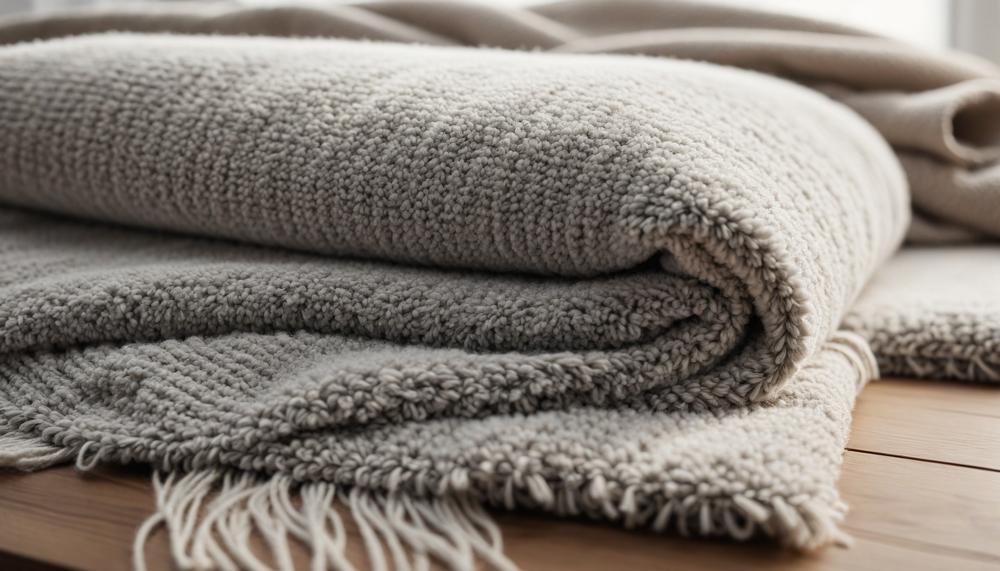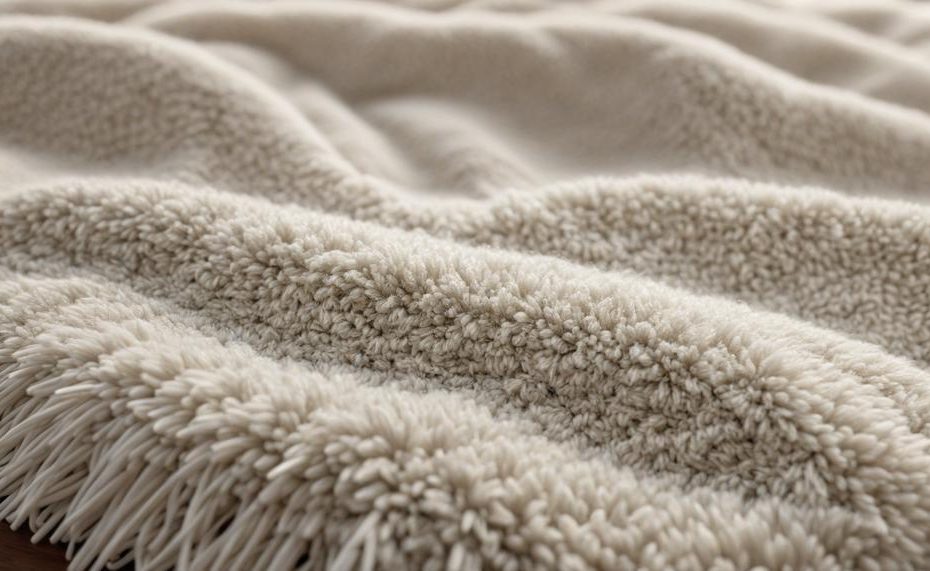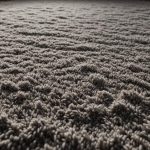Keeping your Sherpa blanket soft and fluffy can be easier than you think. The key to preventing matting lies in how you wash and care for it. Here’s a quick and easy guide to help you maintain that cozy feel:
- Wash in Cold Water: Yes, using cold water on a delicate cycle with mild detergent helps maintain the blanket’s texture.
- Avoid Fabric Softener: No, fabric softener can actually cause matting. Stick to mild detergent instead.
- Skip the Dryer: Yes, air drying is the way to go. To detangle, mix water with a bit of hair conditioner and lightly spritz onto the blanket.
- Brush with Care: Use a boar’s bristle brush to gently comb out any matted areas.
By following these steps, your Sherpa blanket will stay soft, fluffy, and free from matting. Dive into the details below for a comprehensive guide on keeping your favorite blanket in top shape.

Contents
How to Keep Sherpa Blanket From Matting
To keep your sherpa blanket from matting, follow these effective techniques:
| Technique | Details | Why |
| Washing | Cold water, delicate cycle, mild detergent | Preserves fabric texture |
| Avoid Fabric Softeners | No fabric softeners | Prevents fibre damage |
| Drying | Air-dry only | Maintains fluffiness |
| Post-Wash Care | Conditioner mix, boar’s bristle brush | Detangles and restores texture |
| Storage | Cool, dry place, avoid heavy stacking | Prevents matting |
For more detailed care tips, visit this guide on washing sherpa blankets.
What Is Sherpa?
The material composition of a sherpa blanket primarily includes polyester and acrylic. These materials create the distinct texture and warmth associated with sherpa fabric.
Sherpa fabric, often called faux sheepskin or faux shearling, is composed as follows:
| Material | Percentage | Description |
| Polyester | 70% – 80% | A durable, synthetic fiber that provides softness and warmth. Polyester is also resistant to wrinkles and shrinkage. |
| Acrylic | 20% – 30% | A synthetic fiber that adds a wool-like feel to the fabric. Acrylic helps in maintaining the blanket’s fluffy and plush texture. |
This combination results in a lightweight yet highly insulating fabric, mimicking the feel and warmth of natural wool without the associated weight. For those looking for further details on synthetic fabrics like polyester and acrylic, you can explore more on Wikipedia.
Sherpa blankets are designed to offer the luxurious comfort of wool while being easier to care for and more affordable. The polyester content ensures that the blanket is lightweight and durable, whereas the acrylic component contributes to its signature softness and fuzzy texture. This synthetic blend is excellent for those who want the warmth of wool without the heavy maintenance or potential allergens associated with natural wool products.
How To Make Sherpa Soft Again
Restoring the softness of your sherpa blanket can be achieved through a few simple and effective methods. Follow these steps to ensure your sherpa remains plush and cosy:
Proper Washing Techniques
- Cold Water Wash: Wash your sherpa blanket in cold water on a delicate cycle with a mild detergent. Avoid hot water as it can damage the fibres.
- Vinegar Addition: Add half a cup of white vinegar to the rinse cycle to help maintain softness and remove any detergent residues that could cause stiffness.
Avoid Fabric Softeners
- Fabric softeners can cause clumping and dullness in sherpa fabrics. Instead, use a mixture of water and hair conditioner to detangle and lightly spritz onto the sherpa.
Drying Methods
- Air Drying: The best option for preserving softness is air drying. Lay the blanket flat on a clean surface or hang it outside to dry naturally.
- Tumble Dry on Low Heat: If you must use a dryer, tumble dry on a low heat setting. Avoid high heat as it can damage the fibres.
Brushing Out Matting
- Use a boar’s bristle brush to gently comb out any matted areas. Regular brushing can help prevent matting and keep the sherpa fluffy.
Spot Cleaning
- To avoid unnecessary washing, spot clean your sherpa blanket with a damp cloth and mild detergent. Excess moisture can damage the fabric over time.
Sunlight Freshening
- If your sherpa isn’t dirty but has become matted, simply hang it outside in the sunlight for a few hours. Sunlight can naturally freshen and fluff up the fibres.
Brushing Out Sherpa
You should brush your sherpa blanket at least once every two weeks to prevent matting. Regular brushing keeps the fibres from clumping together, maintaining the blanket’s softness and appearance.
Tips for Brushing Your Sherpa Blanket:
- Use the Right Brush: A soft bristle brush or a clothes brush is ideal for maintaining the integrity of the fabric. Avoid hard bristles that could damage the fibres.
- Brushing Technique: Gently brush in one direction to avoid pulling or tearing the fabric. Start from one end and work your way to the other, ensuring even coverage.
- After Washing: Always brush your sherpa blanket after washing and drying to restore its fluffy texture. This helps to remove any remaining lint or loose fibres.
- Regular Maintenance: Even if the blanket doesn’t appear matted, brushing it regularly prevents the onset of matting and keeps it looking fresh and cosy.
Detailed Brushing Schedule:
| Activity | Frequency | Details |
| Brushing | Every 2 weeks | Use a soft bristle brush to gently detangle fibres and prevent matting. |
| Washing | As needed (every 1-2 months) | Wash on a delicate cycle and air dry or tumble dry on low heat. Brush after drying. |
| Fluffing | Every few months | Fluff the blanket by giving it a good shake and a thorough brushing to maintain its volume and softness. |
How Often Should You Soften A Sherpa Throw?
The optimal frequency to soften a sherpa throw to prevent matting and maintain its luxurious softness is approximately once a month.
Over-washing or excessive softening treatments can lead to a dull appearance and degrade the fabric’s integrity over time. To balance between maintaining softness and ensuring durability, following a monthly schedule is recommended.
For detailed steps, consider the following practices:
| Action | Frequency | Details |
| Brushing | Every two weeks | Use a soft bristle brush to prevent matting and maintain fluffiness. |
| Washing | Once a month | Wash on a gentle cycle with mild detergent to avoid damage. |
| Drying | After each wash | Air-dry or use low heat to preserve texture and prevent shrinkage. |
By adhering to these practices, you ensure your sherpa throw remains soft, fluffy, and in excellent condition for a long time.
What Is The Best Way To Dry Sherpa?
The best way to dry a sherpa blanket to prevent matting is to avoid using a dryer altogether. Instead, follow these recommended methods:
| Method | Instructions | Tools Needed |
| Spritz with Water and Hair Conditioner | Mix two cups of water with one teaspoon of hair conditioner in a spray bottle. Shake well and lightly spray the sherpa blanket. | Spray bottle, Water, Hair Conditioner |
| Brush with Boar’s Bristle Brush | After spraying, gently comb out any matted areas to redistribute the fibres. | Boar’s Bristle Brush |
| Air-Dry | Lay the sherpa blanket flat and let it dry naturally to maintain its softness. | Drying Rack or Flat Surface |
By following these steps, you can keep your sherpa blanket in pristine condition, avoiding matting and preserving its softness.
What Is The Best Way To Soften Sherpa?
To soften a sherpa blanket and prevent matting, consider the following effective methods:
- Washing Separately: Use cold water and a mild detergent designed for delicate fabrics. This prevents damage and maintains the blanket’s softness.
- Air Drying: Gently squeeze out excess water after washing and air dry the blanket. Avoid wringing or twisting, which can cause matting and damage.
- Vinegar Addition: Adding vinegar to the wash cycle helps break down residue and restores softness. Use about half a cup during the rinse cycle.
- Avoid High Heat: If using a dryer, opt for low heat or air fluff settings. High heat can damage the fibres, leading to matting and reduced softness.
- Regular Brushing: Use a soft bristle brush or a pet-friendly tangle teezer to regularly brush the blanket. This helps keep the fibres from matting and maintains a fluffy texture.
- Lint Removal: Utilize a lint remover to get rid of pills and fuzz balls, focusing on areas that experience the most friction.
- Conditioner Mixture: For added softness, spritz the blanket with a mixture of water and hair conditioner. Brush with a boar’s bristle brush and air-dry.
- Spot Cleaning: For sherpa sweaters, gently brush off loose dirt, spot clean with a mixture of mild detergent and water, rinse thoroughly, and air dry.
Methods for Softening Sherpa Blanket and Preventing Matting
| Method | Description | Benefits |
| Washing Separately | Use cold water and mild detergent for delicate fabrics | Prevents damage and maintains softness |
| Air Drying | Gently squeeze out excess water and air dry | Avoids matting and maintains shape |
| Vinegar Addition | Add vinegar during the rinse cycle | Breaks down residue, restores softness |
| Low Heat Dryer | Use low heat or air fluff settings | Prevents fibre damage and matting |
| Regular Brushing | Brush with a soft bristle brush or tangle teezer | Prevents matting, keeps texture fluffy |
| Lint Removal | Use a lint remover on high friction areas | Removes pills and fuzz balls |
| Conditioner Mixture | Spritz with water and hair conditioner | Enhances softness, prevents matting |
| Spot Cleaning | Brush off dirt, spot clean with detergent mix | Keeps sweater soft and clean |
Conclusion
Maintaining the plush feel of your Sherpa blanket is straightforward with a few mindful practices. Start by washing it in cold water on a delicate cycle, paired with a mild detergent. Skip the fabric softener as it can lead to matting. Instead, use a solution of water and hair conditioner for detangling post-wash.
Drying is crucial; avoid the dryer and opt for air drying by laying the blanket flat or hanging it. After drying, use a boar’s bristle brush to gently comb out any matted areas, restoring its fluffy texture. Regular brushing also helps in maintaining the blanket’s softness.
Proper storage is key to longevity. Keep your Sherpa blanket in a cool, dry place, avoiding heavy stacking to prevent matting.





